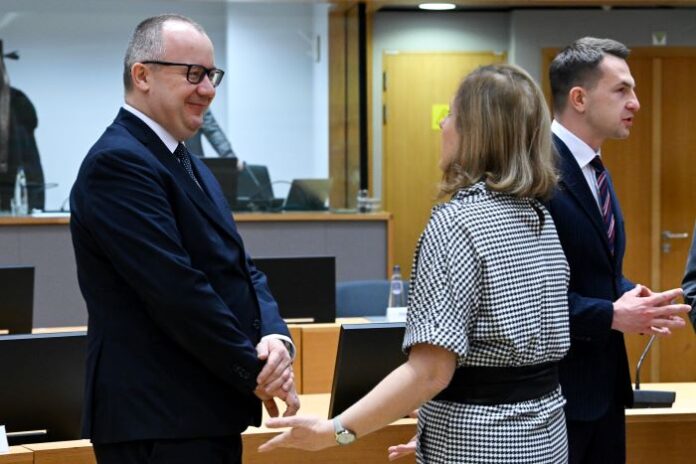Polish Justice Minister Adam Bodnar presented an “action plan” to the European affairs ministers in Brussels on Tuesday. The plan aims to address the concerns about democratic backsliding while ending the conflict between Poland and the EU. Bodnar, a highly respected human rights and constitutional lawyer, argued that “there is no need to continue the Article 7 procedure against Poland as we are all fully engaged in restoring the rule of law.”
If the plan addresses the Commission’s concerns, it could unlock access to billions of euros in frozen EU funds. Senior European Union officials welcomed the plan and hoped it could end years of legal dispute.
“Polish citizens deserve reforms in the judiciary; the changes will include the National Council of the Judiciary, the Supreme Court, the Constitutional Tribunal and the separation of the offices of the Minister of Justice and the Prosecutor General,” the Polish Minister posted on X.
“I also stressed the importance of ongoing developments in cases before the Court of Justice. Dialogue with the European Commission is crucial for effectively implementing reforms and restoring the rule of law.”
In a dispute with the EU since 2017
Poland’s ruling nationalist Law and Justice (PiS) party, which came to power in 2015, has been at odds with the EU’s executive branch due to the implemented judiciary reforms. These reforms gave political control over Poland’s judiciary, which was criticised by many. The European Commission responded in 2017 by launching a legal procedure called Article 7, which threatened to suspend Poland’s EU voting rights to protect the rule of law in Europe. Additionally, the EU blocked access to billions of euros in EU funds due to concerns over the rule of law. However, after the elections in October 2023, the new government, formed by the EPP member Civic Platform, decided to resolve the EU’s concerns. Věra Jourová, the European Commission Vice-President for Values and Transparency, told reporters this is the first positive step forward after six years of discussions and debate under Article 7. This step may lead to the closure of the procedure under Article 7.
Belgian Foreign Minister Hadja Lahbib, whose country currently holds the EU’s rotating presidency, said that the ministers’ reaction was “extremely positive,” adding that “when there is a will, there is a way.” She also noted that the previous government’s justice minister never came to Brussels to address the issue.
“Protecting Europeans’ freedoms remains a top priority for @EU2024BE. Since 2017, the Commission has noted setbacks in Poland. Today, @donaldtusk‘s government is presenting us its reform plan. We welcome this desire for change,” Minister Lahbib posted on X.
EC concerns still prevent the Article 7’s closure.
Jourová has warned that while the action plan is a positive step towards closing Article 7, much work still needs to be done. When asked about the timeline for closing the Article 7 process, Jourová explained that it would depend on how and when the plan is implemented, as well as the response of other member states.
“I have a dream that still during my mandate the application of the Article 7 #TEU on Poland will be removed. Today, 🇵🇱 government made an important 1st step with the Action Plan. We will assist now in implementing the plan to address remaining #RuleofLaw concerns,” Jourová posted on X.
Jourová emphasised that some of the proposals in the Polish plan cannot become law without the approval of President Andrzej Duda, who is a loyal supporter of the nationalist PiS. His term will end in 2025.
EU Justice Commissioner Didier Reynders explained that the Commission and the Polish government must restore the rule of law in the country while fully respecting the law.
Commission President Ursula von der Leyen, who is running for a second term, will visit Warsaw on Friday.

